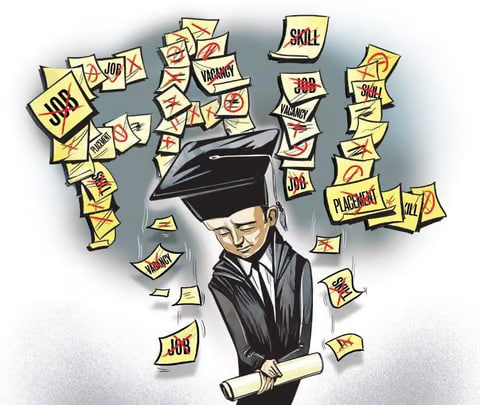Alok Tiwari
Among the failings of the Modi government in the last 10 years, the biggest has been on the employment front. True to its form, the government responded to the challenge by stopping publication of employment figures. Now though, the annual payroll data from Employees Provident Fund Organisation (EPFO) that tracks organised employment presents a damning picture. In the last one year, the country’s private sector has shed seven lakh jobs. This trend is seen across the top five industrialised states of Maharashtra, Tamil Nadu, Karnataka, Gujarat and Haryana. This fall, besides being the worst in the last five years, is in order of magnitude bigger than what was seen even during Covid time in the same data.
The data indicate that the trend of rising freshers’ jobs seen after Covid setback has also been reversed. The figures are as grim as they can be. They reveal that despite slogans and half measures, job creation in the economy has remained sluggish. In fact, the jobs have continued to decline despite overall GDP growth picking up. One early reason was demonetisation, perhaps the biggest and most loony self-goal scored by any government in modern history. The second reason was the global economic shutdown during Covid. But both these events are now well past us and sufficient time has passed for new policies to take effect. Clearly, they are not working.
While the government loves to project the GDP growth numbers and points to the booming stock market, these mean little to the army of youngsters that enter the job market each year. Government’s own economic survey calls for creation of nearly 80 lakh non-agricultural jobs to ensure meaningful economic growth.The dismal job scene was probably among the reasons why the ruling Bharatiya Janata Party suffered huge losses in recent elections. The Budget presented by finance minister Nirmala Sitharaman acknowledges this by coming up with a couple of measures to boost employment as well as skill levels of people. It has sought to spend some ₹2 lakh crore towards this end over the next five years. The measures include direct payments to both new employees and their employers as well as incentives for companies to undertake more internship programmes. It is not clear how far these will have their intended consequences. The track record is not very good.
Government has undertaken measures like the Production Linked Incentive (PLI) scheme to push manufacturing in the country. It has also presided over perhaps the biggest spending spree in history by splurging money on highways and fancy projects like metros in every city and Atal Setu in Mumbai. Spending on infrastructure is supposed to make life easy and spur economic growth.
Maybe this will happen over the course of time but for now most new projects are marked by extremely low return on investment. If anything, they have only added to the income and benefit disparities. It is fantastic to zip through expressways if you are a car owner, but it is not so good if you are among those living outside this charmed circle. To them, these may be the evidence that growth is passing them by.
The government has also increased hiring in the government sector. While it will provide good jobs to some, it cannot be a solution to the unemployment problem. For this, a massive boost in private sector jobs is the only answer. But sadly, private sector jobs are not only shrinking in numbers but also in quality. The number of secure, well-paying jobs with benefits is decreasing. On the other hand, the number of gig workers like delivery persons and drivers of app-based cabs is increasing. The ongoing trend of large-scale adoption of technologies like artificial intelligence does not bode well for even knowledge workers.

Technologies cannot be stopped, but innovative ways will have to be found to encourage companies not to fire for avoidable automation. As anyone needing any service from any company will vouch, it is virtually impossible to talk to a human assistant as companies have gone in for chatbots and IVRS-based customer service. This is an awful trend in a country needing jobs and having a relatively less tech savvy population. Could incentives be directed at reversing this? Similarly, could a cab company that employs its drivers be taxed at a lower rate than one that has them as associates? Could certain benefits flow to companies that have bigger payroll per crore of investment than those with smaller ones? Businesses will ultimately do what makes more money for them. The policymakers need to figure out a way of making business more profitable for bigger employers than those who make do with fewer.
Therefore, the government needs to introspect on what is keeping private sector investment down. It can push the economy by its own spending only so much. It needs to do much more to make doing business easy. Despite putting up a business-friendly face, the government has done something entirely opposite. Just talk to even those businesspeople who are supporters of the BJP. They all lament about no decrease in red tape and increase in tax terrorism. Cutting these out just needs political will and is immediately doable.
Finally, the government’s own job creation must not be in fatter bureaucracy but in sectors that improve quality of life for citizens. We need many more police personnel for better law and order, better and bigger government educational institutions and hospitals to ensure educated and healthy citizenry, more civic workers to have cleaner, encroachment-free cities, more traffic wardens. These have suffered neglect for decades. Addressing them will not only make our economy more inclusive but also promote investment while ensuring better quality of life.




